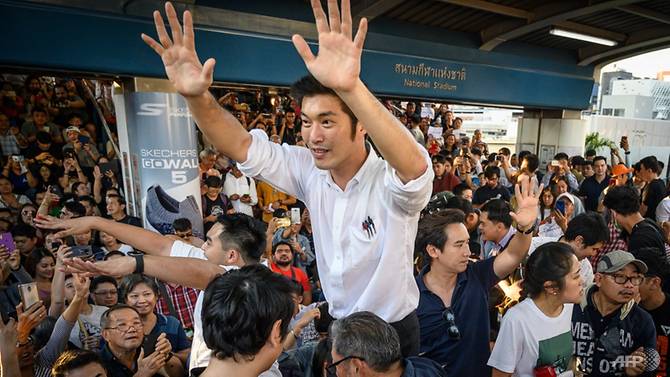Verna Yu in Hong Kong
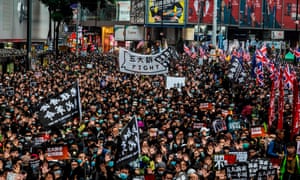
A huge New Year’s Day march in Hong Kong has ended in mass arrests and street clashes as the anti-government movement – now in its eighth month – continued into 2020.
Police detained about 400 people on charges including illegal assembly and possession of offensive weapons after the rally on Wednesday, which organisers said was attended by more than a million people. It was one of the largest numbers of arrests in a single day since the unrest began.
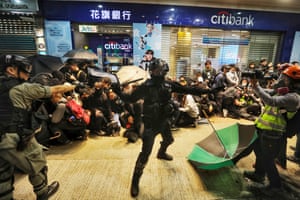
But the march had begun in a mood of carnival celebration – there were protesters in costumes and families with children and elderly people. Marchers chanted slogans including “Liberate Hong Kong, revolution of our era”.
Riot police fired teargas rounds in Wan Chai district after protesters threw objects at officers who had arrested several people for allegedly vandalising a bank.
Some protesters retaliated by throwing molotov cocktails at the police, but many in the crowd were caught by surprise as the march was expected to be peaceful and most did not wear protective gear.
Police demanded that the protest organisers, the Civil Human Rights Front, immediately call off the demonstration, but large crowds continued to march and police declared that they were taking part in an illegal assembly.
As night fell, police used water cannon on crowds in Wan Chai and the financial district of Central. Protesters laid bricks across the main thoroughfare in Central in an attempt to impede the police’s advance towards the area.
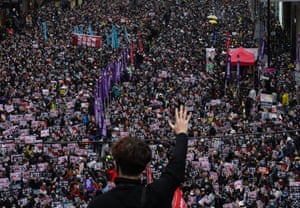
Photograph: Vincent Yu/AP
A police statement said protesters had blocked roads with barricades, dug up bricks from pavements and set fires to banks and cash machines.
At a late-night press briefing, Senior Supt Ng Lok Chun blamed radical protesters for “hijacking” and disrupting the march and said police had fired teargas because they were surrounded by protesters who were throwing objects at them.
There had already been a bleak start to 2020: shortly after revellers counted down to midnight and shouted “Happy new year!”, police in the central district of Mong Kok shot teargas at protesters who set off fireworks and set fire to roadblocks.
On Tuesday night police deployed water cannon to disperse protesters while armoured vehicles cleared roadblocks. The crowd had gathered outside a metro station where people were leaving flowers to commemorate protesters rumoured to have died during a clash with police four months ago. The government denies that the deaths occurred.
The anti-government movement in Hong Kong, sparked by an extradition bill that would have allowed individuals to be sent to China for trial, is showing no signs of abating. Protesters say they will not give up unless the government meets their demands, which include universal suffrage and an independent investigation into police brutality.
As of last week, 6,494 people had been arrested since the movement started in June, some as young as 12, according to the police.
Many in Hong Kong, including pro-democracy supporters, are weary of the frequent violent confrontations in the movement and are seeking new directions in their attempt to press the government into conceding to their demands.
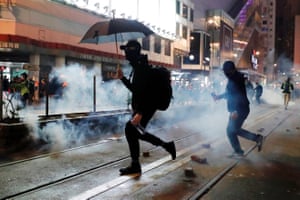
Some are urging fellow Hong Kongers on social media to use economic means to put pressure on the government instead, including joining trade unions so that they can launch strikes and other collective actions more effectively.
“We want to show our determination to the world that we will not back down on our resistance against an authoritarian regime,” said Mary Chin, a former bank employee in her 40s.
The Civil Human Rights Front condemned the police’s abrupt revocation of its permission for the march, which it estimated was attended by a million people.
“The government has shown its unwillingness to listen to the voices of the mass and it has infringed on their right to assembly,” it said in a statement. “Hong Kongers shall not back down and peace shall not resume with the ongoing police brutality.”
In his new year address, the Chinese president, Xi Jinping, acknowledged that “the situation in Hong Kong has been everybody’s concern over the past few months” as he called for “a harmonious and stable environment” for Hong Kong.
Sounding relatively conciliatory compared with earlier, more threatening remarks, Xi said in the televised address: “Hong Kong’s prosperity and stability is the wish of Hong Kong compatriots and the expectation for the people of the motherland.”



